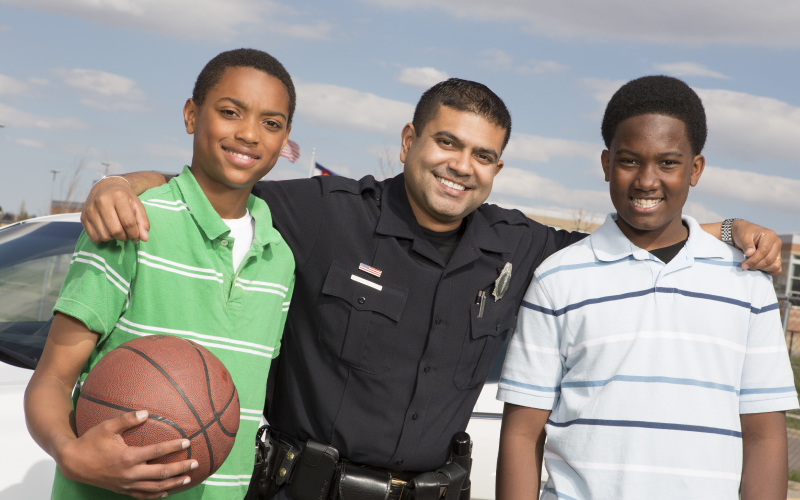TxSSC
A Parent's Guide to School Safety Toolkit
4.0 School-Based Law Enforcement and School Resource Officers

All schools must ensure that at least one armed security officer is present during regular school hours. The security officer must be a school district police officer, school resource officer, or commissioned peace officer employed as security personnel. A school district can claim an exception due to lack of funding or qualified personnel. If an exception is claimed, the district must develop a standard they can comply with, which may include other people who can act as a security officer.
What is the purpose of law enforcement in schools?

The overall mission of law enforcement in schools today is to support and promote healthy relationships to ensure a safe learning and teaching environment. School-based law enforcement officers act as a resource to students, staff members, and the community to provide guidance in law enforcement matters. Law enforcement officers and school districts are encouraged to establish healthy relationships to ensure that first responders at all jurisdictional levels and across all disciplines work together more effectively and efficiently.
What are the school district options for law enforcement?
Options for school districts, when deciding to have a law enforcement presence, include:
- ISD Police Department: Law enforcement agency created and employed by the district.
- Contractual: The district has a contract or memorandum of understanding with a local law enforcement agency to provide law enforcement services.
- Marshal Program: Allows public school districts and open-enrollment charter schools to appoint school marshals. The sole purpose of a school marshal is to prevent the act of murder or serious bodily injury on school premises and act only as defined by the written regulations adopted by the school board or governing body.
- Guardian Plan: Under the authority of the Federal Gun Free Schools Act (GFSA) and Texas Penal Code, school districts can grant written permission for anyone, including designated employees, to carry firearms on campus.
- Security Contractors: Allows public school districts and open enrollment charter schools to employ or contract with licensed security personnel.
Definitions of Key Law Enforcement Roles:
School-Based Law Enforcement (SBLE)
- School-Based Law Enforcement officers are licensed peace officers who are employed in a school, or group of schools, with the goal of promoting a safe learning environment.
School Resource Officer (SRO)
- School Resource Officers are licensed peace officers employed by a local law enforcement agency (city, county, etc.) that are permanently assigned to serve the school district or campus.
Roles of the SRO/SBLE within the educational setting:
- Responsible for the safety and security of their assigned school campuses.
- Available as a resource within the educational setting to connect the school community to outside resources.
- Establish healthy relationships within the school setting by working as a team with students, parents, and school staff.
The SRO/SBLE officer duties must be included in:
- The district improvement plan.
- The student code of conduct.
- Any memo of understanding (MOU) with the contracting law enforcement agency.
- Any other campus or district document describing the role of peace officers, school resource officers or security personnel in the district.
In determining law enforcement duties, Texas law:
- Requires the district board to coordinate with district campus behavior coordinators and other district employees to ensure that the officers and security personnel are tasked only with duties related to law enforcement intervention and are not tasked with behavioral or administrative duties better addressed by other district employees.
- Requires school districts to include in their district improvement plan the duties of the SRO/SBLE which cannot include routine student discipline or formal contact with students unrelated to law enforcement duties.
- Does not prohibit a school district peace officer, a school resource officer, or security personnel from informal contact, such as participating in an assembly, book club, or eating lunch with students.
What is the mandated training for SROs and SBLE officers?
As their roles are important, SRO/SBLE receive mandated training on the following topics:
- Child and adolescent brain development.
- Mental health crisis intervention.
- De-escalation techniques and techniques for limiting use of force.
- Mental and behavioral needs of children with disabilities.
- Restorative justice and the application of restorative practices within the educational setting.
- Active shooter training which includes best practices when responding to active threats on campus.
- National Incident Management System (NIMS) training
- Incident Command System (ICS) training
What Should My Child Know?
If your child’s school has law enforcement on campus, be sure that your child understands the purpose of law enforcement: to support and promote healthy relationships and ensure a safe learning and teaching environment for your child.